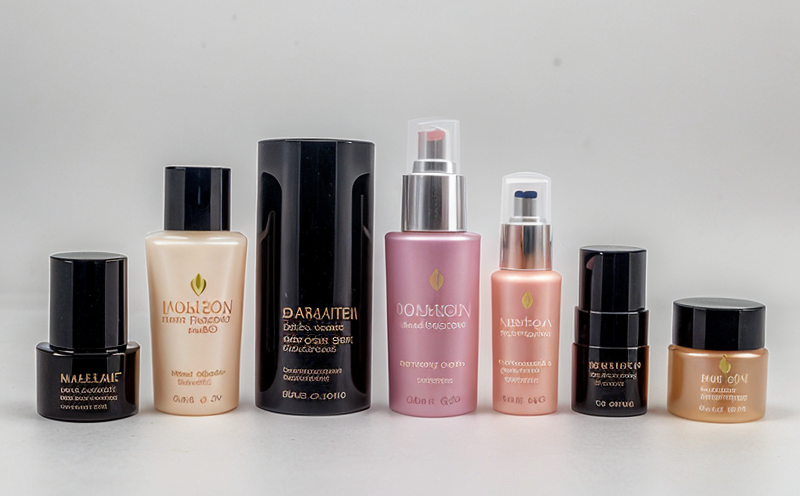Aluminum Canister Safety Testing in Aerosol Cosmetics
The safety testing of aluminum canisters used in aerosol cosmetics is a critical process that ensures consumer protection and regulatory compliance. This service addresses the potential risks associated with metal-to-metal contact, seal integrity, and compatibility between the container material and cosmetic contents. The primary goal is to prevent adverse reactions such as corrosion, gas evolution, or chemical migration that could compromise product safety.
Aluminum canisters are widely used in the cosmetics industry due to their lightweight, recyclable properties, and aesthetic appeal. However, these benefits come with challenges related to compatibility with certain cosmetic ingredients. For instance, some active ingredients may interact chemically with aluminum, leading to potential issues such as pitting or discoloration of the container, which can affect product quality.
The testing process involves a series of rigorous steps aimed at identifying and mitigating these risks. Specimens are prepared by filling aluminum canisters with specific formulations representative of real-world cosmetic products. The samples undergo accelerated aging under controlled conditions to simulate extended shelf life exposure. This allows for the detection of any adverse reactions that might not be apparent during routine testing.
The methodology adheres strictly to international standards such as ASTM D2349 and ISO 18057, which provide guidelines for the safe design and manufacturing of aerosol containers. These standards are crucial in ensuring that the test procedures are both standardized and scientifically sound. The testing protocol includes visual inspection for any signs of corrosion or discoloration, chemical analysis to detect potential migration into the product, and pressure testing to assess seal integrity.
By adhering to these stringent protocols, we can provide reliable data on the safety and performance of aluminum canisters in aerosol cosmetics. This not only helps manufacturers meet regulatory requirements but also enhances consumer trust by ensuring that products are free from harmful contaminants. The insights gained from this testing process play a vital role in product development, quality assurance, and compliance with global standards.
Scope and Methodology
The scope of aluminum canister safety testing encompasses several key areas that ensure the container's integrity and compatibility with cosmetic products. The testing process is designed to evaluate various aspects including chemical migration, metal-to-metal contact, and seal integrity.
Chemical migration tests are conducted using a range of techniques such as headspace gas analysis and extraction methods like Soxhlet or microwave-assisted extraction. These methods help in quantifying the amount of potentially harmful compounds that might leach into the product from the container material. Metal-to-metal contact is evaluated by examining the compatibility between aluminum and other metals used in the canister assembly, such as the valve stem and cap.
Seal integrity testing involves pressurizing the canisters to determine their resistance to leaks under specified conditions. This ensures that the product remains contained within its container throughout its shelf life. The methodology also includes visual inspections for any signs of corrosion or deformation, which could indicate issues with the material compatibility or manufacturing quality.
Compliance with international standards such as ASTM D2349 and ISO 18057 is paramount in ensuring that the testing process meets both industry best practices and regulatory requirements. These standards provide a framework for conducting tests that are reproducible and reliable, thereby enhancing the credibility of the test results.
Industry Applications
| Industry Segment | Specific Application |
|---|---|
| Cosmetics and Personal Care Products | Evaluation of aluminum canister compatibility with various cosmetic formulations. |
| Pharmaceuticals | Testing for safety in aerosol containers used for medication delivery. |
| Pesticides and Agricultural Chemicals | |
| Sprays and Dispensing Systems | Evaluation of metal-to-metal contact and seal integrity in spray containers. |
The aluminum canister safety testing service is particularly valuable for the cosmetics sector, where product safety and consumer trust are paramount. By ensuring that the container does not interact adversely with the cosmetic contents, we help manufacturers produce safe and reliable products. This service also extends its utility to pharmaceuticals and agricultural chemicals, where aerosol containers play a crucial role in delivery systems.
The rigorous testing process helps manufacturers comply with stringent regulations while maintaining product quality. The insights gained from this testing are invaluable for product development, ensuring that new formulations are safe and compatible with the container material used.
Environmental and Sustainability Contributions
The aluminum canister safety testing service not only ensures product safety but also contributes positively to environmental sustainability. Aluminum is a highly recyclable metal, which makes it an environmentally friendly choice for packaging in the cosmetics industry. By ensuring that the container does not interact adversely with the cosmetic contents, we help manufacturers produce safe and reliable products without compromising on sustainability.
The testing process helps identify potential issues early in the product development cycle, allowing for design improvements to enhance both safety and environmental impact. For instance, if a particular formulation causes pitting or discoloration of the aluminum canister, this information can be used to reformulate the product or choose alternative container materials.
Additionally, by ensuring that aerosol containers meet all regulatory requirements, we contribute to reducing waste and promoting responsible disposal practices. This is in line with global efforts to minimize environmental impact and promote sustainable development. The insights gained from our testing process are shared with clients to inform ongoing improvements in product safety and sustainability.
Through this service, we help the cosmetics industry meet its responsibility to consumers while also addressing broader environmental concerns. By ensuring that aerosol containers do not cause harm or degradation of products, we contribute to a more sustainable and responsible packaging sector.





